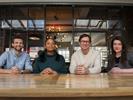Arun Sudhaman 04 Feb 2013 // 12:00AM GMT
Stephen Waddington joined Ketchum London late last year to lead digital and social media across EMEA. In the process, Waddington left the firm he co-founded and sold, Speed Communications, to make a return to the network agency world.
A visible presence on the UK PR circuit, Waddington is perhaps best-known for his advocacy of digital platforms and tools, and for a keen ability to spot upcoming social media trends.
Two months into his Ketchum tenure, the Holmes Report finds Waddington in effusive form about "big brands and proper budgets", dismissing any notion of 'channel fatigue' among clients in typically forthright manner.
However, Waddington remains unmistakably concerned about the PR industry's digital prospects, noting in a recent blogpost that a lack of confidence has seen it lose ground in the "turf war" against advertising and digital agencies.
What is it like making that transition from running an agency to focusing on social media within a bigger network?
Obviously, I’ve relinquished a degree of control. I now have to report to someone who I sit opposite. I thought that might be challenging but really it’s not because [EMEA CEO] David Gallagher is such a light-touch manager. If you fuck up, you know about it, but if you set a clear plan and strategy and deliver upon it, it’s good.
Every door you open, you find opportunity. Our challenge at Ketchum has been to align what we do as a business with the client need. That’s my primary job. From both a specialist point of view, building teams, and to help everyone within the agency 'up-skill' what they do.
Our threat at Ketchum isn’t necessarily other PR agencies - it’s advertising agencies and digital agencies. They are modernising faster. Ad agencies because they are creative- and production-led, they are used to creating content and building narrative. And digital agencies - they are building from the ground up so they haven’t got the traditional structure.
After congratulating themselves on cracking this digital thing, I’ve recently noticed a view taking hold that PR firms are not necessarily making the next step in terms of how they build their social media capabilities. Do you agree?
We’ve got the conversation bit, we’ve got the social bit. Agencies like We Are Social and specialist hotshops have cracked that. Your analysis is spot-on. We congratulated ourselves because we could build Facebook communities and engage in an always-on way. The bit we haven’t cracked yet is building services - Facebook apps, mobile sites etc… That’s actually the hardcore bit of digital and is where a lot of the money is as well. And that is firmly owned by digital agencies and I wonder whether we will ever get there.
There seems to be an unwillingness among PR firms to dip their toes into the production side.
It’s a very different type of business. It’s more project-driven and is much more technical. We’re just really uncomfortable as a PR agency going there. It’s the same reason we missed out on search.
In our 2013 Digital Forecast, Citi’s Frank Eliason says that clients may pull back from social media this year. Do you agree?
We’re seeing no evidence of that from our clients at all. There is tremendous appetite. The days of 'we need a bit of Twitter, we need a blog, we need a FB page,' are disappearing. We see less and less briefs where clients are specifying channels. Social for the sake of social - that bubble has popped. It has to be rooted in a business challenge.
Do you see any channel fatigue? I say this after reading your post about the 10 ways brands can use Vine.
As an industry, and as practitioners, it’s beholden upon us to investigate all these new channels as they come along. People are saying exactly the same thing about Vine as they said about Twitter five years ago. It’s tied down to business benefit. If your audiences suddenly jump onto these new platforms, you’re going to miss out on the conversations that happen and the opportunity to drive traffic. You just have to take each platform on its merits. I’m really surprised about people going negative about Vine. You’re officially saying you are cutting off an opportunity to sell stuff for clients.
After Vine, Pinterest, Instagram...there seems to be a narrative now that these social networks are becoming less useful.
You’re being deliberately contentious. There’s an initial surge of excitement and everyone says it's the greatest thing since the last greatest thing. They mature and find a natural place in the new media environment. Instagram and Pinterest have both become very popular among teens and young audiences in their 20s. Female audiences are all over them. If you’re Asos and you want to reach those audiences then you’re probably all over them. It’s always got to be rooted in the business problem and the audience.
Our 2013 forecast also pointed to some problems with digital metrics. How good is the industry getting at this?
The industry has always been really, really shit at measuring. The whole AVE thing is just finding a proxy for value. You’ve got to look for business change and it has to be rooted in your objective.
Everything we do online leaves a footprint we can track. The internet marketing industry is driving the change here. It’s showing how you can tie investment and activity to actual outcome. Just look at the amount of work that Google has been doing around pipeline and funnel management. Massive amounts of energy are being invested in this by the digital guys and so we’re becoming a lot smarter. Our clients are demanding it and the technology is there to do it - we’re finally realising as an industry that things like AMEC are quite important.
For a youngster coming into the industry, who wants to progress in digital - what is the one thing they fall down on?
We get people walking into the door, who say they are digital. We find they are not digital natives at all. They are not on Twitter, Pinterest...they are not blogging. At least create your own content so you understand the challenges brands face doing this. And be curious about it. It’s interesting what Google+ is doing with AuthorRank - you can see the day coming when brands will have to hire known individuals as thought leaders and journalists if you want to appear on Google. This is sizzling hot - it gives the PR industry a chance to win back turf from the search industry.


































.jpg)





















.tmb-135x100.png)









